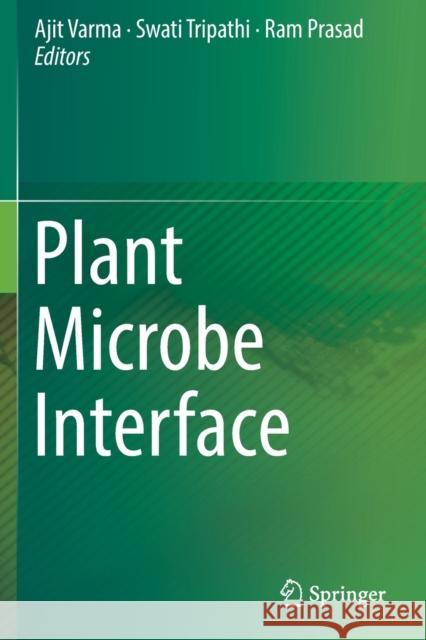Plant Microbe Interface » książka



Plant Microbe Interface
ISBN-13: 9783030198336 / Angielski / Miękka / 2020 / 415 str.
Plant Microbe Interface
ISBN-13: 9783030198336 / Angielski / Miękka / 2020 / 415 str.
(netto: 499,55 VAT: 5%)
Najniższa cena z 30 dni: 501,19
ok. 16-18 dni roboczych.
Darmowa dostawa!
1. Mycorrhizae Resource Allocation in Root Development and Root Morphology
Ibrahim Ortaş, Mazhar Rafique and Md Toufiq Iqbal
2. Plant-Mycorrhizal and Rhizobial Interfaces: Underlying Mechanisms and Their Roles in Sustainable Agroecosystems
Neera Garg, Amrit Bharti, Amrita Sharma and Shyna Bhalla
3. Truffles and Morels: Two Different Evolutionary Strategies of Fungal-Plant Interactions in the Pezizales
Francesca Ori, Ian Hall, Carmelo Gianchino, Mirco Iotti and Alessandra Zambonelli
4. AM Fungi and Trichoderma Interaction for Biological Control of Soil Borne Plant Pathogen Fusarium oxysporum
Khirood Doley, Mahesh Borde and Mohan Kulkarni
5. Management of Soil-Borne Diseases of Grain Legumes Though Broad-Spectrum Actinomycetes Having Plant Growth-Promoting and Biocontrol Traits
Subramaniam Gopalakrishnan and Vadlamudi Srinivas
6. Soil-microbes-plants Interactions and Ecological Diversity
Prem Chandra and Enespa
7. Pathogen and Management of Fungal Wilt of Banana Through Biocontrol Agents
Narendra Kumar and S.M. Paul Khurana
8. Potential of Plant-Microbe Interactions in Management of Pesticides Riddled Soil
Narendra Kumar, Sarica Chaturvedi and S.M. Paul Khurana
9. Algae and Cyanobacteria as Biocontrol Agents of Fungal Plant Pathogens
Hillary Righini and Roberta Roberti
10. Non-target Effects of Trichoderma on Plants, and Soil Microbial Communities
Monika Jangir, Satyawati Sharma, and Shilpi Sharma
11. Olive Anthracnose and its Management by Fungal Endophytes: An Overview
Fátima Martins, José Alberto Pereira, and Paula Baptista
12. Metagenomics as a Tool to Explore New Insights from Plant Microbe Interface
Prachi Bhargava, Mahejibin Khan, Ankit Verma, Anushka Singh, Sukriti Singh, Siddharth Vats and Reeta Goel
13. A Concise Compilation of the Diverse Detection Methods to Study Plant-Microbe Interfaces at the Cellular and Molecular Level: The Past, Present and Future
Regina Sharmila Dass and Rathijit Mallick
14. Anthosphere Microbiome and Their Associated Interactions at the Aromatic Interface
Nagarathinam Arunkumar, Suchitra Rakesh, Kaushik Rajaram, Narayanasamy Ravi Kumar and Siva Sundara Kumar Durairajan
15. Efficiency of Soil Plant Microbes for Healthy Plant Immunity and Sustainable Agricultural System
Yasir Nishat, Gufran Ahmad, Mohd. Danish, Mohd. Haris, and Touseef Hussain
16. Biological Control of Soft-rot of Ginger: Current Trends and Future Prospects
Mahendra Rai, Patrycja Golińska, Sudhir Shende, Priti Paralikar, Pramod Ingle and Avinash P. Ingle
17. Biological Effects of Uranium and Its Decay Products on Soil Microbes, Plants, and Humans
Chanda Siddoo-Atwal
18. An Overview of Effective Concentration of Industrial Effluent for Improving Crop Production and its Effect on Mico-bio zone of soil
Sangeeta, Gita Rani and Rani Devi
Prof Dr Ajit Varma: Professor Varma completed his PhD at Allahabad University and is a former Professor at the School of Life Sciences, Jawaharlal Nehru University, India. Presently, he is Group Dy. Vice Chancellor at Amity University, Uttar Pradesh, India. He is Distinguished Scientist & Professor of Eminence at the Amity Institute of Microbial Technology; and Vice Chairman of the Amity Science, Technology & Innovation Foundation at Amity University, Uttar Pradesh, India. He has published more than 374 papers in respected journals and has served as Editor in Chief of the Soil Biology Series, Springer Verlag Germany. Dr Varma is a Fellow of the Alexander-von-Humboldt Society, Germany, elected Fellow of the National Academy Agricultural Sciences, and Fellow of the Microbiology Society of India.
Dr Swati Tripathi: Assistant Professor at Amity Institute of Microbial Technology, Amity University, Noida, India. She is working on plant microbe interaction, and microbial biotechnology. Dr Tripathi has a number of research papers and review articles to her credit in the journals of international repute. She has her post doctoral experience from South Korea and has been awarded Early Career Research Award recently.
Dr Ram Prasad: Assistant Professor at Amity Institute of Microbial Technology, Amity University, Noida, India. He is working on plant microbe interaction, nanobiotechnology, and microbial biotechnology. Dr Prasad has edited several books and has a number of research papers and review articles to his credit in the journals of international repute. During 2014, Dr Prasad has been awarded American Cancer Society UICC International Fellowship for Beginning Investigator, USA. Presently, he is working as Research Associate Professor at School of Environmental Sciences and Engineering, Sun Yat-Sen University, China.
This book shares the latest insights into the genetic basis of molecular communication between plants and their microbial consortia. Further, the book highlights the capabilities of the rhizosphere and endosphere, which help manage ecosystem responses to climate change, nutrient cycling and sequestration of carbon; and discusses their application to the development and management of renewable energy sources.
In their natural environments, plants are surrounded by a tremendous number of microorganisms. Some microbes directly interact with plants in a mutually beneficial fashion, while others colonize plants solely for their own advantage. In addition, microbes can indirectly affect plants by drastically altering their environments. Understanding the complex nature of the plant-microbe interface (PMI) can pave the way for novel strategies to improve plant productivity in an eco-friendly manner.
The PMI approach focuses on understanding the physical, molecular, and chemical interactions between organisms in order to determine their functional roles in biological, physical, chemical and environmental systems. Although several metabolites from plants and microbes have now been fully characterized, their roles in chemical interactions between these associates remain poorly understood, and require further investigation.
1997-2026 DolnySlask.com Agencja Internetowa
KrainaKsiazek.PL - Księgarnia Internetowa









